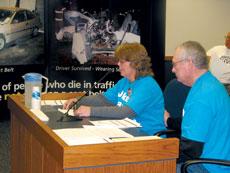Witnesses tug at heart strings

Cheri Bowden and Steve Bowden, parents of Jacob Yates, testify in support of the primary seat belt bill. Their son died in a traffic accident on Nov. 25, 2006.
The Missouri House Transportation Committee saw a lot of tears at its Feb. 13 meeting.
HB 90, the primary seat belt law, sponsored by Rep. Neal C. St. Onge (R-St. Louis) came with initial testimony that threw out statistic after statistic about how a primary seat belt law would save 90 lives a year.
And how 1,089 people died in Missouri traffic accidents in 2006, and that 70 percent were not wearing their seat belts.
“The numbers are cold, harsh and distilled,” said Pete Rahn, director of the Missouri Department of Transportation.
The first witnesses also talked about how the law focused on younger drivers. Those witnesses were followed by a slew of lobbyists who merely walked up and said the group they represent supports the bill.
Then the whole demeanor of the room changed.
“Basically what we’ve heard this morning is the factual data that will help you pass the primary seat belt law,” said Dale Findlay, of the Missouri Safety Council. “But there’s more to it than that, the impact of a single crash affects so many people.”
Then came the tears.
One paramedic explained how he has seen a lot of wrecks and was even in one himself where a seatbelt saved his life. He was paralyzed for a short time, but lived and is walking now.
Another emergency professional talked about the night he was called to a horrible accident one night and when he saw the car he knew there could be no survivors. Then he heard the screams of his daughter, who only suffered minor injuries because she wore her seatbelt.
But the biggest tearjerker was when the group from the small town of Ava, Mo., came to the witness stand and talked about all of their losses.
The town of less than 600 has had 15 students die in car accidents in the last 20 years, three of which have been in the last year. One of those three was Jacob Yates, the only one out of the 15 to be wearing a seatbelt.
His brother and both his parents came to the meeting to tell Jacob’s story. They also brought 40 letters from Ava High School students pleading with the committee to pass the law. The high school in recent years has had random seat belt checks to help reduce the number of deaths.
“There have been a number of kids that have complained but then returned to school after a car accident and thanked the school for saving their lives because they had their seat belts on,” said Cheri Bowden, Jacob Yates’ mother. “As a community, we decided that our children matter and we had to stop the needless deaths by such an easy thing as wearing our seat belts. You see, car accidents don’t pick and choose who they are going to involve.”
That’s why Bowden believes everyone should be required to wear a seat belt and have the law actively enforced.
“You will not save every person with this law, but the percentage is so great that the one that you save might be yours or someone in your own families,” Bowden said. “Just as there is no word for a parent who loses a child, there is no word for a child that loses a brother or a sister. Those losses are too great.
“If you decide to not pass this primary seat belt law you are accepting the responsibility of each one of those deaths that continue to occur because of an accident with a person not wearing a seat belt.”
The bill was brought to a vote and passed the committee, 7-1.
If the bill is passed it, will make Missouri the 26th state to adopt a primary seatbelt law, which allows law enforcement officers to pull over a vehicle if anyone in the car is not wearing their seatbelt.
As it stands now, it is the only traffic-related offense that is not reason enough to pull over a vehicle.
Your donation will support the student journalists of Missouri Southern State University. Your contribution will allow us to purchase equipment and cover our annual website hosting costs.















